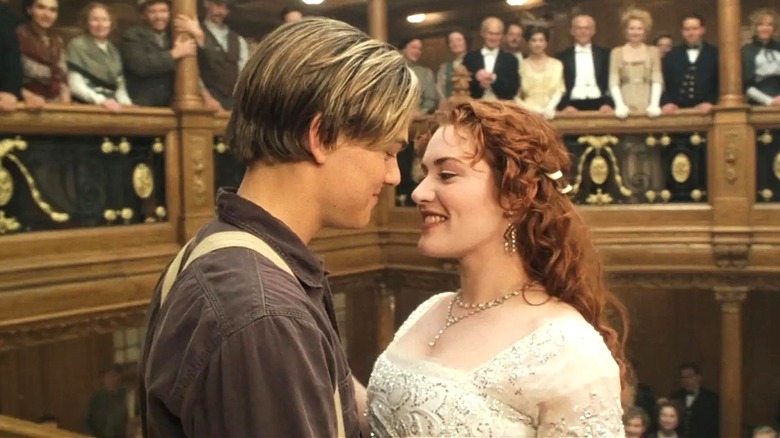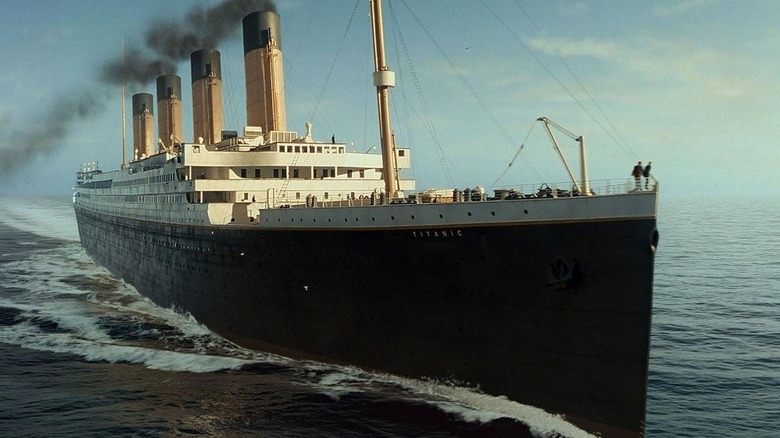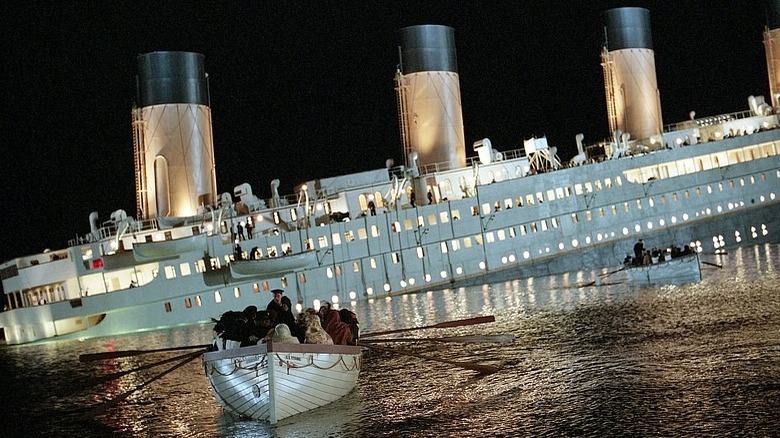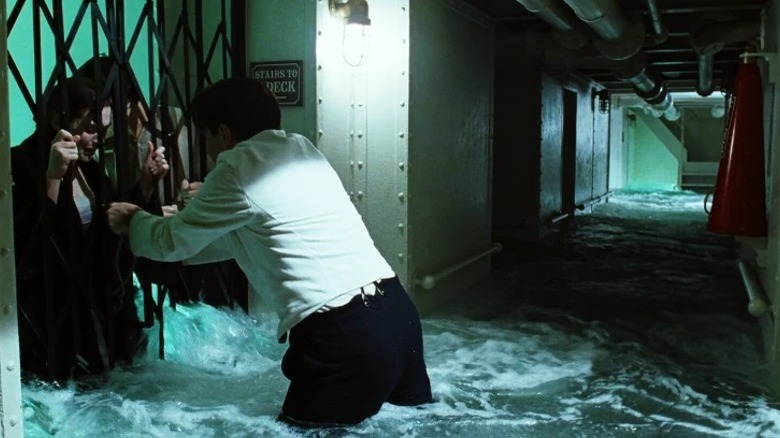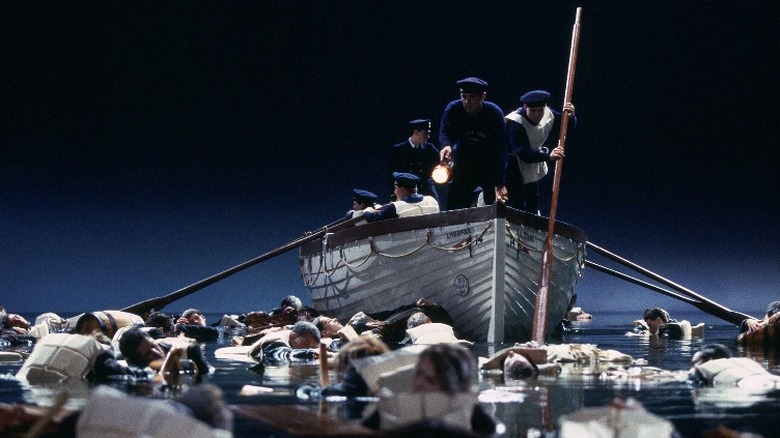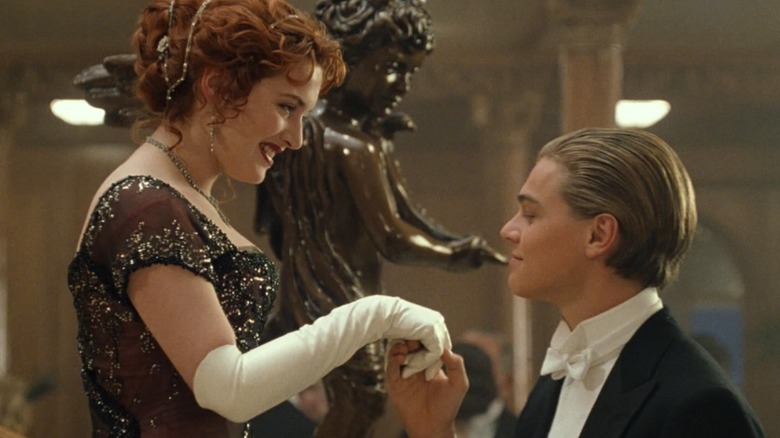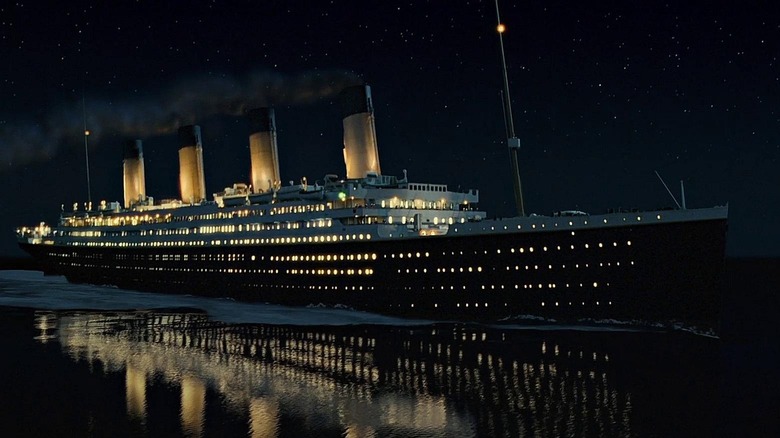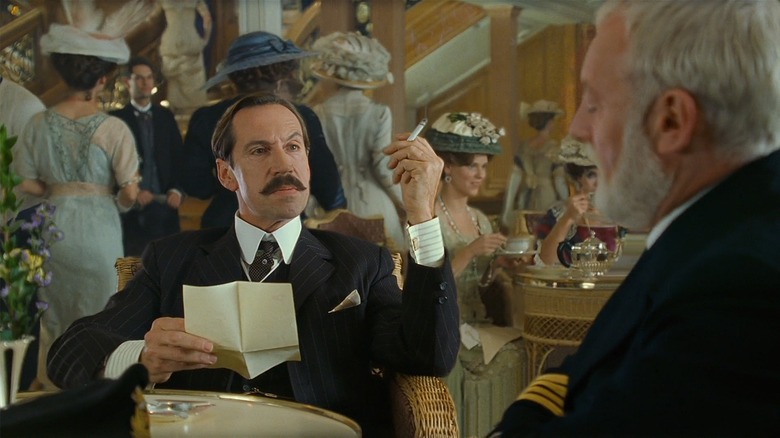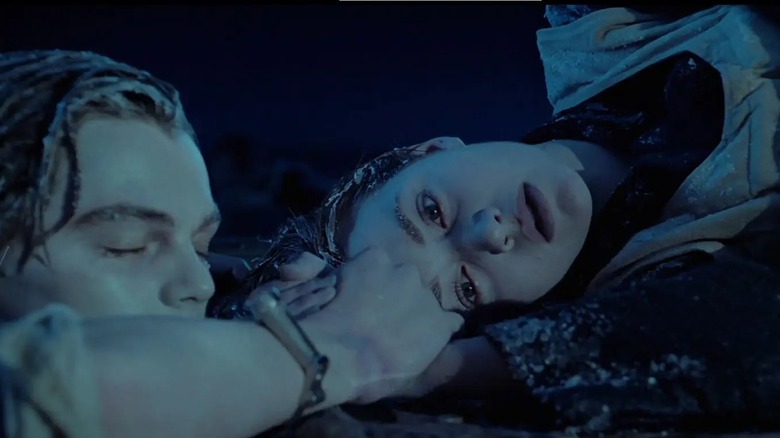The Untold Truth Of Titanic
James Cameron has experienced plenty of highs in his career to date, but the pinnacle of his success will likely always be the Oscar juggernaut "Titanic." His talent extends beyond compelling storytelling — the Canadian filmmaker possesses a unique ability to tap into the spirit of the times, a skill unmatched by his contemporaries. Equally noteworthy is his knack for finding executives who shield him from the barrage of criticism that tends to arise from those who come to appreciate his vision only after the fact.
Today, even the most casual fan is aware that "Titanic" shattered records, both at the Academy Awards and at the box office. A more devoted fan might be aware that this achievement was completely unprecedented at the time. The film presented immense challenges during production, and the media had predicted its failure, expecting it to become one of the biggest flops in cinematic history. This epic tale of love and tragedy is over 25 years old now, but the story behind it never gets any less interesting. It's time to delve into the lesser-known facts about this Cameron classic.
The first Titanic film was made only a month after the sinking
Netflix adding "Titanic" to its library in June 2023 sparked understandable outrage among critics and fans, who felt it exploited the recent OceanGate submersible tragedy. Many believed the timing lacked class and respect for grieving families. Netflix issued a statement asserting that the timing was purely coincidental. Regardless of its veracity, such swift releases are not uncommon. Just one month after the ship sank, the first-ever movie about the RMS Titanic, titled "Saved from the Titanic," emerged.
Starring real-life survivor Dorothy Gibson, a former vaudevillian and theater actor, the 10-minute film caused controversy due to its perceived insensitivity. Although it achieved success upon release, assessing its quality today is impossible as it tragically got destroyed in a fire at the Éclair Moving Picture Company, the studio behind the picture.
Interestingly, the studio took artistic liberties when penning the script and, like James Cameron's later version, introduced a fictionalized love interest named Jack. In reality, Gibson was involved with Jules Brulatour, co-founder of Universal Pictures, who likely encouraged her to create the movie. Their relationship is believed to have served as inspiration for the characters of Charles Foster Kane and Susan Alexander in "Citizen Kane."
James Cameron thought the movie would end his career
James Cameron, known for his unwavering confidence in his craft, has established a reputation as one of Hollywood's most fearless individuals. Time and time again, he has defied overwhelming odds to create unforgettable moments in modern cinematic history. However, like any human being, he too experiences moments of self-doubt. During an interview commemorating the 25th anniversary of "Titanic," Cameron was asked if the negative publicity surrounding its production had affected him. He candidly admitted that he believed his career was finished.
Nevertheless, he persevered and completed the movie. He recounted a pivotal moment when he realized that he had something special: During a screening, an audience member became deeply invested in the romance between Jack and Rose. This revelation affirmed his belief in the film's potential. Furthermore, the producers found encouragement when, during a test screening aimed at pinpointing which parts of the movie could be cut to bring the runtime down, an audience member suggested shortening the sinking sequence but not the romance. This indicated that the story was resonating with viewers.
However, Cameron and the team were aware that success was not yet guaranteed. Despite recognizing they had a strong film, the question remained: Would it be commercially successful? They needed to generate more than $350 million to achieve profitability, an arduous task. Nevertheless, upon its release, the movie surpassed everyone's expectations.
Cameron gave up his pay because he went over budget
The majority of Hollywood movies have approximate pre-agreed budgets. The goal is to minimize the time spent shooting the film, which ultimately translates to reduced expenses. However, James Cameron's "Titanic" exceeded its filming schedule by 22 days, leading to a budget that ballooned to well over the originally intended amount. $110 million was initially set aside for the picture, but it ended up taking around $200 million to complete. Once all other costs were factored in, "Titanic" set Fox and Paramount back around $295 million. To demonstrate accountability to the studios, Cameron opted to forgo his directing fee and back-end points.
The reasons behind the film going over schedule and over budget are varied. One contributing factor was Cameron's willingness to explore innovative and costly techniques, such as employing a camera crane that set a Guinness World Record for its remarkable length. Cameron strived for meticulous accuracy in depicting the details of the Titanic, from the cutlery to the carpets. Additionally, he faced the challenge of unpredictable weather conditions, once waiting for 10 days to capture the perfect sunset for the iconic Rose and Jack kiss scene.
Cameron acknowledged that he had to take responsibility for the film's significant budget overrun — speaking to Howard Stern, he said that the buck stopped with him as director. Consequently, he missed out on a substantial payday, but, fortunately, crossing the $2 billion mark has become somewhat of a recent habit for him.
The exhausting shoot prompted an SAG investigation
James Cameron's approach to creating blockbuster hits has always been, to say the least, challenging. Before transitioning to groundbreaking CGI in his "Avatar" franchise, he aimed to make everything appear as authentic as possible using practical effects. Cameron believed that by showcasing the immense scale of the Titanic, audiences would comprehend why it was deemed unsinkable. To achieve this, he constructed a replica of the ship at 90% scale. This was placed into a huge tank that was filled with sea water. Thousands of background actors were immersed in the water, resulting in cases of flu, broken bones, and even kidney infections.
The tumultuous circumstances prompted a complaint from the Screen Actors' Guild (SAG) representative, leading to an investigation. Ultimately, the investigation concluded that nothing on set violated safety standards. However, there's no denying that making the movie was a grueling process. Kate Winslet later called the shoot "an ordeal," revealing that they worked six days a week on night shoots, leaving the cast and crew exhausted. She sustained a number of injuries, she told The Standard-Times. "I chipped a small bone in my elbow and at one point I had deep bruises all over my arms."
Cameron has been to the Titanic's wreck dozens of times
James Cameron's fascination with deep-sea exploration dates back to his youth, and he has since become a highly regarded figure in that field. He embarked on 12 trips to the wreck of the Titanic prior to the release of his film about the disaster, exploring its interior and recording footage, some of which ultimately made its way into the film. However, not all of the wreckage shots featured in the film are the real thing. Because it's so dark down there (the resting place of the Titanic is some 12,480 feet deep) they needed to use computer-generated imagery and miniature models for some shots.
Even if all the footage that Cameron shot while visiting what remains of the ship wasn't used, his trips to the wreck provided valuable guidance in constructing the realistic sets showcased in the film. Cameron continued to visit the wreck multiple times even after the movie was completed and released. He now estimates that he has spent more time at the Titanic than the ship's captain spent aboard it. The intrepid filmmaker has been down to the wreck 33 times in total at the time of this writing.
Cameron listened to a lot of Enya when writing the movie
James Cameron's previous movies were renowned for their gritty storytelling, but "Titanic" marked a departure as he sought to incorporate a central romantic element. Cameron has revealed that his writing process often involves immersing himself in music that aligns with the mood of his current project. For "Titanic," he found himself oddly drawn to the music of Irish artist Enya, allowing her compositions to influence his writing.
This unconventional choice proved successful, as the screenplay of the movie garnered significant praise. Cameron admitted that he was not a fan of Enya before working on "Titanic," but he was captivated by the themes of "longing and loss" present in her music, as well as the enveloping Celtic sound, he told Brian Linehan. Cameron felt the Irish sound was fitting, considering that a large number of Irish individuals occupied the ship's steerage section, and consequently suffered the greatest loss of life.
Interestingly, when Cameron was seeking a composer for the film, James Horner read the script and proposed a Celtic-inspired approach. Cameron promptly hired him, and Horner went on to receive numerous accolades for his work on the film, including two Oscars and three Grammy Awards.
Keeping everyone safe was Cameron's toughest challenge
With the script reaching a level of satisfaction where everyone involved felt the love story and connection to the ship were properly portrayed, Cameron considered the first major challenge resolved. However, the greatest challenge he faced was ensuring safety during the filming process. With hundreds of background actors on set and water-filled scenes intertwined with electric cables powering equipment, Cameron prioritized avoiding any mishaps.
Movies undoubtedly hold significant cultural value, fostering unity and empathy among people. However, their importance pales in comparison to human life. Unfortunately, deaths on movie sets are not unheard of. Cameron's unwavering focus on prioritizing safety amid the demands of the box office is commendable. However, complaints persist about Cameron's reputation as a perfectionist, pushing his cast and crew to the point of exhaustion with seemingly unreasonable demands, such as restricting access to toilet breaks. According to The Independent, he once made t-shirts for crewmembers that read "You Can't Scare Me – I Work For Jim Cameron."
Titanic made more money in its second week
Hollywood movies tend to generate the most revenue during their first week of release, as fans who have eagerly anticipated a film are typically the first in line to watch it. "Most blockbuster films' ticket sales drop between 50% and 70% from the opening weekend to the second week," says CNBC. However, "Titanic" flipped this norm on its head, as its second-week performance exceeded that of its first. This unexpected turn of events "gave everybody pause," James Cameron told The Hollywood Reporter.
By the time of the film's release, Cameron had grown weary of the negative press he had faced throughout the production process. As a strategic move, he chose to premiere the movie in Tokyo and then show it in London after that. This allowed American audiences to catch wind of the positive word-of-mouth surrounding the film before it reached them. This initial buzz set the stage for the movie to market itself, swiftly becoming a must-see for audiences everywhere.
Cameron wanted Titanic to stand apart from other blockbusters
Artists often have a delicate relationship with critics. While critics expect artists to have thick skin and accept negative reactions to their work, using the feedback to improve their future projects, it can be difficult for directors, writers, and actors to handle harsh criticism, especially when they've put their heart and soul into their work.
Following the tremendous success of "Titanic," James Cameron was asked by Brian Linehan if he took critics seriously, despite the negative press he had received before the film's release. Rather than using this opportunity to dismiss the detractors, he acknowledged the significance of reviews, recognizing that critics usually provide valuable feedback in a more "articulate" manner than general audiences.
Cameron added that while "Titanic" is a "populist film" aimed at box office success, he cared about more than just financial gains. He considers it to be different from other blockbuster films of the era such as "Independence Day," which he said is guilty of "shoddiness" despite its financial success. The 1990s was a time marked by various disaster movies like "Volcano" and "Armageddon," but none of these films achieved the same level of success as "Titanic."
Cameron knew his depiction of J. Bruce Ismay was probably inaccurate
James Cameron conducted extensive research for "Titanic," but his portrayal of certain figures in the story may not accurately align with recorded history. One individual who has been portrayed as a villain in various renditions of the Titanic story is J. Bruce Ismay, president of the White Star Line (the company that built that Titanic). Played by Jonathan Hyde in Cameron's film, the character is depicted as arrogant and primarily concerned with securing positive press coverage for his company. At one point, he even pressures the captain to increase the ship's speed for publicity purposes.
When it becomes clear that the Titanic is doomed, Ismay is among the first to board the lifeboats, leading to him being labeled a coward by the press for not giving his place to one of the many women and children who died. Ismay being demonized in the press is factual, though historians have suggested that this was more to do with a feud he had with newspaper magnate William Randolph Hearst rather than his actions that night. "He and Ismay had fallen out years before over Ismay not cooperating with the press with regard to an accident that happened to a White Star Line ship," Paul Louden-Brown of the Titanic Historical Society told the BBC.
Although Cameron was informed of inaccuracies in his portrayal of Ismay by Louden-Brown (who was a consultant on the film), the director chose to keep the storyline as it was. "Every single filmmaker has found that betrayal to be too delicious not to incorporate into their film," Louden-Brown added.
Cameron conducted a scientific experiment to settle the door debate
There's a faction of fans who insist that Jack could have easily fit on the door alongside Rose to survive at the end of "Titanic." While the point of the scene was seemingly to evoke empathy for the lives lost that day, highlighting the stark class divide, it seems some fans can't let go of the door debate. Years later, James Cameron — always one to take things to the extreme — decided to settle the debate once and for all with a rather serious scientific experiment.
The filmmaker hired a hypothermia expert and enlisted two stunt performers to recreate the situation, using a door in an ice bath. Cameron recorded the entire experiment for a National Geographic special, hoping to provide closure for those die-hard fans still hung up on the ending of "Titanic." The results of this meticulous and somewhat amusing experiment were, sadly, inconclusive.
Most scenarios they tried led to both Jack and Rose perishing before the lifeboats arrived, though there was one position that just might have meant they both lived long enough to be rescued. "Jack might have lived, but there's a lot of variables," Cameron said. "I think his thought process was, 'I'm not going to do one thing that jeopardies her,' and that's 100% in character."
Fans complained to the Academy when Leonardo DiCaprio was snubbed
By the time the Oscar nominations were announced, "Titanic" had already established its dominance at the box office, maintaining the top spot in America for an impressive 14 weeks. The nominations themselves brought both joy and disappointment. The film received a staggering 14 nominations, acknowledging the hard work of various departments. However, there was a noticeable absence among the nominations: Leonardo DiCaprio.
Jon Landau, the movie's producer, theorized that the Academy chose not to recognize DiCaprio's performance because his character lacked an underlying flaw. James Cameron speculated that it might have been an age-related factor. Both arguments hold some credibility when considering the Academy's historical trends in the best actor category. Nevertheless, DiCaprio took the snub to heart, opting to skip the event altogether and not attend to support his colleagues.
DiCaprio's devoted fans were equally disheartened by the omission. Some even went as far as contacting the Academy, pleading for a reversal of their decision. One furious woman told the Academy's Los Angeles headquarters that "the whole state of Florida was upset," a spokesman told Entertainment Weekly. This sentiment persisted throughout DiCaprio's career, with his fans feeling that the Academy consistently denied him the recognition he rightfully deserved. It wasn't until his role in "The Revenant" that he finally secured his well-deserved Oscar win, putting an end to the prolonged anticipation.
James Cameron almost 'clocked' Harvey Weinstein on Titanic's big night at the Oscars
During the 1990s, the now disgraced producer Harvey Weinstein gained a reputation as one of Hollywood's most effective Oscar campaigners. While his campaigning skills were respected, his conduct was becoming increasingly ugly. One specific incident that deeply disturbed James Cameron was Weinstein's treatment of Guillermo del Toro during the production of his debut American film "Mimic." Weinstein attempted to fire the Mexican director, but the decision was thwarted by the film's cast members revolting against it.
After the film achieved success, Weinstein shamelessly attempted to claim credit for its accomplishments, said Cameron. Their paths crossed on Oscar night when Cameron won his first Oscar for editing "Titanic." Weinstein approached him, attempting to pitch his company. However, Cameron promptly dismissed him, which infuriated Weinstein. "I did defend Guillermo and I called Harvey on his bulls***, and then he got very loud and verbally abusive and almost potentially physically violent," Cameron told The Hollywood Reporter. "And he was about to get clocked by an Oscar — which would've been highly appropriate, I think."
